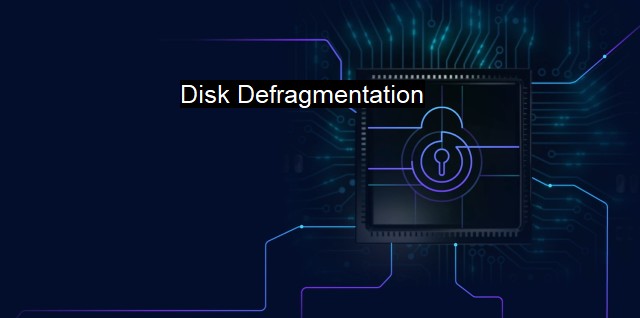What is Disk Defragmentation?
Secure Your System: The K ey I mportance of D isk D efragmentation in Cybersecurity and Antivirus S upport
Disk defragmentation is a process that reduces the degree of fragmentation in file systems. In the realm of cybersecurity and antivirus software, it plays a substantial role in maintaining system health and performance. To understand the need for and benefit of disk defragmentation, we must first delve into the workings of a computer's file storage.When files are created, modified, or deleted, hard drives store those changes in available spaces, rather than putting all files-related data in a single consolidated place. Over time, these scattered fragments can accumulate and slow down data retrieval processes. This phenomenon is known as disk fragmentation. It slows down system performance, thereby creating an element of vulnerability.
Antivirus and cybersecurity systems rely heavily on prompt execution and detection of processes and threats. When a system is fragmented, the speed is compromised, possibly causing delay in threat detection and response.
Disk defragmentation helps address these issues by reorganizing the stored data and aligning it for faster access. it puts the pieces of each file in a consecutive order. The drive now spends less time searching through scattered fragments, expediting data retrieval, and hence, quickening the operational speed of antivirus software.
Another aspect to consider is that through regular defragmentation, the drive endurance is improved because the read/write head has to make fewer movements to retrieve data. The health of the drive, thus, directly impacts the efficacy and efficiency of security software, and system integrity.
Periodic disk defragmentation forms a part of a comprehensive cybersecurity strategy. Though often overlooked, it has implications for system efficiency, protection against attacks, and file corruption. Fragmentation can reduce the ability of antivirus programs to operate securely. Delayed scanning may provide more time for malware or viruses to evade detection, leading to increased vulnerability. Hence disk defragmentation can improve overall cybersecurity hygiene.
Disk defragmentation should be approached sensibly. Over-concentration on this process can lead to excessive wear and tear. Also, modern operating systems automatically manage disk defragmentation rendering manual execution often unnecessary.
It's worth mentioning that Disk Defragmentation applies significantly to traditional mechanical or solid-state hard drives. These storage systems are physical in nature, and hence, the physical organization of data significantly impacts their performance. For novel memory formats such as flash drives or Solid State Drives (SSDs), which store data electronically, defragmentation is not required or advisable because their performance is not significantly affected by data fragmentation.
Disk defragmentation, although sounds trivial, is a part of consistent cybersecurity best practices. It improves the system's performance and subsequently, the speed and effectiveness of installed antivirus applications. It helps prolong the lifespan of the drive, enhancing system reliability and reducing the possibility of data loss or corruption, a crucial aspect of maintaining data integrity.
In an era where security threats are progressively evolving, optimizing all aspects of a system's operation, including disk defragmenting, becomes critical. It needs calculated implementation so as not to overburden or undermine specific formats of data storage.
Remember, a holistic cybersecurity approach is not merely about fighting off existing threats but also about heading off potential future attacks. By ensuring minor things like regular disk defragmentation, users can play a vital role in preemptive defense and help establish robust cybersecurity.

Disk Defragmentation FAQs
What is disk defragmentation and how can it improve cybersecurity?
Disk defragmentation is the process of organizing and optimizing the files and data stored on a hard drive. This can help improve cybersecurity by preventing data loss or corruption, as well as increasing the speed and efficiency of antivirus scans. By defragmenting your disks regularly, you can help ensure that your system runs smoothly and is better protected against potential cyber threats.How often should I run disk defragmentation to enhance my antivirus performance?
The frequency of disk defragmentation depends on how heavily you use your computer. If you use your computer often and store a lot of files, it is recommended to defragment your disks at least once a month. If you use your computer less frequently or primarily for basic tasks like web browsing and email, you may only need to defragment your disks every few months.Can disk defragmentation harm my computer's performance and make it vulnerable to cyber attacks?
Disk defragmentation is generally considered safe and can even improve your computer's performance and cybersecurity. However, it is important to choose a reputable disk defragmentation tool and follow proper precautions, such as backing up your data before defragmenting your disks. Failing to do so could potentially lead to data loss, corruption, or other issues that could compromise your system's security.Is disk defragmentation necessary if I have an antivirus software installed on my computer?
Yes, disk defragmentation is still necessary even if you have antivirus software installed on your computer. While antivirus software can help protect your system from external threats, disk defragmentation helps optimize your system's internal processes and can improve the overall performance and resilience of your computer. By combining both antivirus software and disk defragmentation, you can help ensure that your computer is well-protected and functioning at its best.| | A | | | B | | | C | | | D | | | E | | | F | | | G | | | H | | | I | | | J | | | K | | | L | | | M | |
| | N | | | O | | | P | | | Q | | | R | | | S | | | T | | | U | | | V | | | W | | | X | | | Y | | | Z | |
| | 1 | | | 2 | | | 3 | | | 4 | | | 7 | | | 8 | | |||||||